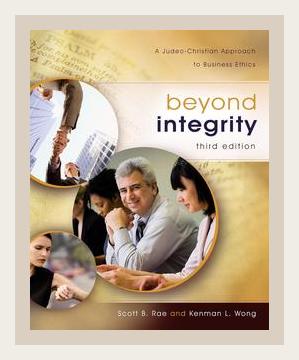Business Law and EthicsBusiness Ethics
**
Introduction
“Beyond Integrity” by Scott Rae and Kenman L. Wong is a comprehensive exploration of business ethics through the lens of Judeo-Christian values. The authors aim to provide a robust ethical framework for business professionals by integrating biblical principles with ethical theory and real-world applications. The book is divided into several sections, each tackling different aspects of ethics in a business context, while also incorporating case studies and discussion questions to facilitate deeper understanding.
1. The Theoretical Foundations of Business Ethics
Major Points:
– Ethical Relativism vs. Moral Absolutism: The book contrasts ethical relativism, which suggests that morality varies between cultures and individuals, with moral absolutism rooted in Judeo-Christian principles denoting universal moral truths.
– Deontological Ethics and Teleological Ethics: It explains deontological ethics (duty-based) as prominent in conventional morality and teleological ethics (consequence-based), prevalent in business decision-making.
Concrete Example:
– Ethical relativism in practice is discussed through the case of multinational companies adjusting their environmental practices to local standards, which might be lower than their home countries’.
Action Steps:
– For Ethical Relativism vs. Moral Absolutism: Adopt a non-negotiable stance on core moral principles such as honesty and justice, regardless of local business practices.
– For Deontological and Teleological Ethics: Create a decision-making framework that balances duty-based integrity with outcome-based practicality by developing policies that ensure ethical duties are met while considering the impacts on stakeholders.
2. Biblical Principles and Business Ethics
Major Points:
– The Imago Dei Principle: Asserts the inherent dignity and worth of every individual, which should guide ethical behavior in business.
– Justice and Love: Encourages treating employees, customers, and partners justly and with love, reflecting divine justice and love.
Concrete Example:
– The book references cases where companies have implemented fair wages and humane working conditions as expressions of employees’ inherent dignity.
Action Steps:
– For the Imago Dei Principle: Implement fair hiring practices and invest in employee development programs that enhance personal and professional growth.
– For Justice and Love: Ensure that all company policies, from compensation to conflict resolution, reflect fairness and kindness, going beyond the bare legal requirements to support wellbeing.
3. Contemporary Ethical Issues in Business
Major Points:
– Corporate Social Responsibility (CSR): Discusses CSR as an extension of biblical stewardship, urging companies to take active roles in societal well-being.
– Environmental Stewardship: Emphasizes responsibility for the Earth, rooted in the biblical narrative of Genesis.
Concrete Example:
– Details companies like Patagonia and their commitments to environmental sustainability as models of operationalizing stewardship ideals.
Action Steps:
– For CSR: Develop and implement CSR initiatives that address local community needs, focusing on education, health, and economic developments, such as offering scholarships or supporting local entrepreneurship.
– For Environmental Stewardship: Adopt sustainable practices, like reducing waste and carbon footprints, implementing recycling programs, and using renewable energy sources.
4. Ethical Decision-Making and Leadership
Major Points:
– Servant Leadership: Promotes leadership that prioritizes the needs and growth of employees over personal gain.
– Ethical Decision-Making Models: Introduces models that integrate both spiritual (prayer, scripture) and rational considerations (cost-benefit analysis).
Concrete Example:
– Illustrates the success of servant leadership through the case of Southwest Airlines, where leaders emphasize team cohesion and employee satisfaction.
Action Steps:
– For Servant Leadership: Facilitate open communication channels where feedback is welcomed, demonstrate humility, and prioritize employee welfare and professional growth.
– For Ethical Decision-Making Models: Develop a decision-making template that includes both ethical and practical considerations, and hold regular ethics training sessions incorporating these models.
5. Ethical Issues in the Workplace
Major Points:
– Integrity in Advertising and Sales: Urges transparency and honesty in marketing practices.
– Addressing Workplace Harassment: Emphasizes creating a culture where all forms of harassment are actively discouraged.
Concrete Example:
– The book reviews cases in which companies faced backlash for misleading advertising and how their honesty or deception affected their reputation and legal standing.
Action Steps:
– For Integrity in Advertising and Sales: Ensure all marketing materials are truthful and that claims can be substantiated. Regularly audit marketing strategies to align with ethical standards.
– For Addressing Workplace Harassment: Implement a zero-tolerance harassment policy and provide regular training for employees and managers on recognizing and preventing harassment.
6. Global Business Ethics
Major Points:
– Cross-Cultural Ethical Standards: Discusses the challenges of maintaining ethical consistency when operating across different cultures.
– Bribery and Corruption: Stresses the importance of resisting corrupt practices even in environments where such behavior is normalized.
Concrete Example:
– Describes scenarios where businesses have successfully navigated corrupt environments, citing instances where companies left markets to avoid compromising their ethical standards.
Action Steps:
– For Cross-Cultural Ethical Standards: Develop a global ethics policy that emphasizes core values while allowing flexibility in less critical practices to respect cultural differences.
– For Bribery and Corruption: Establish clear protocols for dealing with demands for bribes and create anonymous reporting systems for employees to report unethical practices safely.
Conclusion
“Beyond Integrity” blends theoretical foundations with vivid real-world applications, aiming to foster an ethical business culture firmly anchored in Judeo-Christian values. By offering a combination of moral principles, illustrative case studies, and actionable steps, Rae and Wong not only outline the importance of ethical behavior in today’s business world but also provide clear guidelines for implementation.
Each chapter of “Beyond Integrity” serves as a roadmap for business professionals who seek to navigate their careers with a strong moral compass. By adopting these Judeo-Christian ethical principles and translating them into concrete actions, individuals can contribute to building more compassionate, fair, and ultimately successful organizations.
